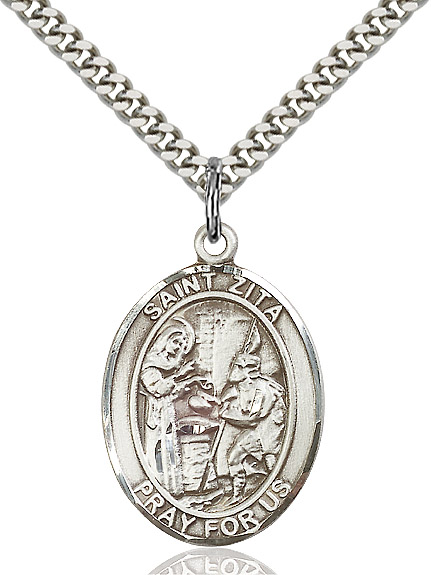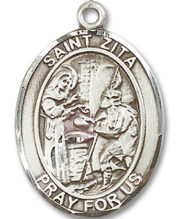$58.99 – $1,254.00
St. Zita Medal
- St. Zita is the patron saint of domestic servants, waiters.
- St. Zita’s feast day is celebrated on April 27th.
This St. Zita medal has been proudly hand-made for over a century by Bliss’ team of artists in Rhode Island. The St. Zita medal is crafted to last a lifetime.
St. Zita Medal
This St. Zita Medal and Necklace features a pendant with a hand pressed image of St. Zita surrounded by the words ‘St. Zita Pray for Us’.
Sterling Silver St. Zita Medal and Necklace
14KT Gold Filled St. Zita Medal and Necklace
14KT Gold St Zita Medal
St. Zita Medal
Zita was the daughter of very poor, pious Italian parents, agricultural laborers who lived at Bozzanello, three miles from Lucca. Each morning the family went to early Mass. Zita’s life was simply and very happy until she was twelve years old.
Serving God through Service to Others
Increasing poverty compelled the parents to try to find their child a situation as a servant. The father accompanied Zita to Lucca, and there found for her a position with the Fatinelli family, who lived in a palace near the church of Frediano. It was here that little Zita began the life of a servant, and where she remained for nearly fifty years in spite of the many sufferings she had to endure.
At first all the worst of duties were assigned to her. She was poorly fed and received very low wages; yet she never complained. Before anyone else arose she could be seen daily at the five o’clock Mass, as had been her practice from early youth. A special devotion to Jesus in His Passion enabled her to bear patiently and cheerfully the ill-temper of her employers; their harsh treatment and unreasonable orders; the quarrelsome and unkind fellow servants; overwork and fatigue.
Prayer and Holy Communion, and the constant realization of the Presence of God sustained the Saint in her trials. Finally Mr. Fatinelli, seeing the success which attended Zita’s undertakings, gave her charge of his children and of the household. She scrupulously fulfilled the trust. Her patience gradually conquered the jealousy of her fellow servants, while her prayers and toil eventually sanctified the whole house.
The Many Miracles of Saint Zita
God performed many miracles for His holy, humble servant during her lifetime. On one of the great Feasts of the Church she had gone to Mass as usual, and after Communion became so absorbed in prayer that she forgot the time until the sun was high in the heavens. She rushed home, it being the morning when it was her duty to bake the bread. Upon arrival, she opened the flour chest, and there, to her amazement, found all the loaves kneaded and ready to be put into the oven. She questioned everyone in the house in vain, and when it came to the ears of her mistress, she gravely said: “It is clear that the Angels have done this for Zita, and that this delicious bread was kneaded by no human hands”.
On Saturdays it was Zita’s great delight to go to the little church and convent of St. Angelo, about six miles from Lucca, across the river Serchio. One Saturday, detainted longer than usual by household duties, she still set out, though evening was coming on. A man on horseback, who knew her, and who was going to the same place, stopped and said: “Do not think of going on to St. Angelo tonight. Darkness will soon be here and you will lose your way, and perhaps perish in crossing the river”. But Zita, thanking him, continued on the way, simply saying: “Our Lord will take me there safely”.
The horseman galloped on Upon arriving at the church, to his amazement he Zita kneeling at the gate in prayer. “How did you get he before me?” he exclaimed. Looking up, smiling, she replied: “As it pleased God, so it has happened”.
Pilgrimage to the Church of St. Mary Magdalen
Zita had a great devotion to St. Mary Magdalen and longed to visit a famous church between Lucca and Pisa that was dedicated to the Saint. At that time there was war between the people of those towns and no one ventured near this church for fear of being robbed or murdered: but this did not deter Zita. Having an evening to spare, she started off, carrying a candle to burn at the Saint’s shrine. It was a good ten miles’ walk, and when she reached the church it was nightfall and the doors were locked.
Overcome with fatigue she sat on the church steps and fell asleep. Meanwhile a violent wind and rain storm arose, but still she slept and her candle continued to burn. Awak ening early in the morning, she was surprised to find the church doors open, and that, though the water covered the steps and road, she herself was quite dry. The parish Priest arrived at five o’clock as usual to say Mass and was astonished to find the doors open and Zita praying by the altar. No one but himself had the key, so it was evident that no human hand had opened them.
Zita lived an ordinary life in the eyes of the world, but a supernatural one in sight of the angels, until she was sixty years old. Not a trace of anxiety could be seen on her face as she lay dying. With a smile wreathing her lips and with hands clasped, whilst her eyes looked upward, she passed away on April 27, 1278. As soon as she passed away a brilliant light was seen above the house, and all the people who saw it ran to the Casa Fatinelli, crying: “The Saint is dead!”
Many miraculous cures took place at the time of Zita’s funeral. Within forty years of her death all Italy looked upon her as a Saint. Her tomb was opened in 1446, 1581, 1652 and 1811, and on each occasion the body was found in perfect form. St. Zita was beatified by Pope Innocent XI in 1696, and canonized by Pope Benedict XIV.
St. Zita Rosary
UPC: 617759295290
Brand: Bliss
| Metal Finishing | |
|---|---|
| Size |
Be the first to review “St. Zita Medal and Necklace” Cancel reply
You must be logged in to post a review.





Reviews
There are no reviews yet.